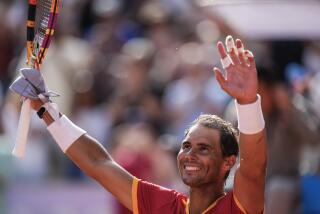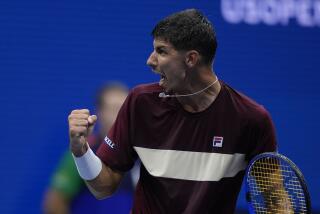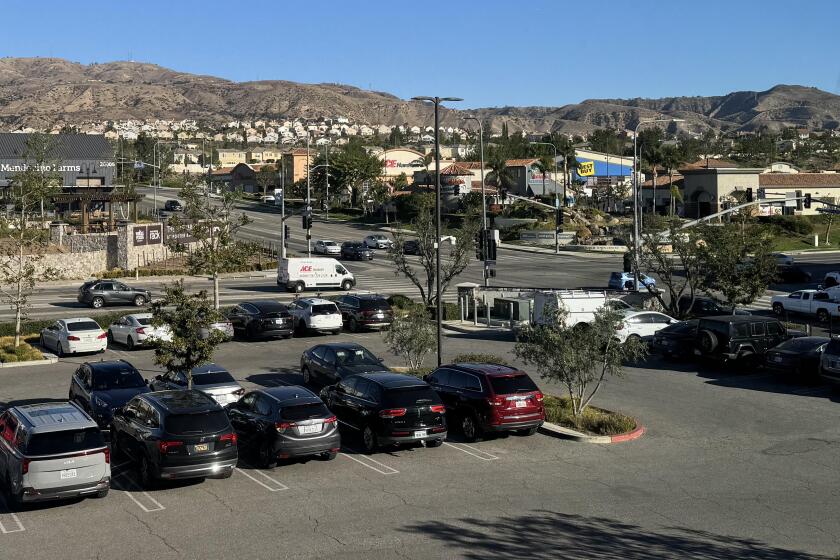Rafael Nadal defeats Novak Djokovic for French Open title, tying Roger Federer in Grand Slam titles
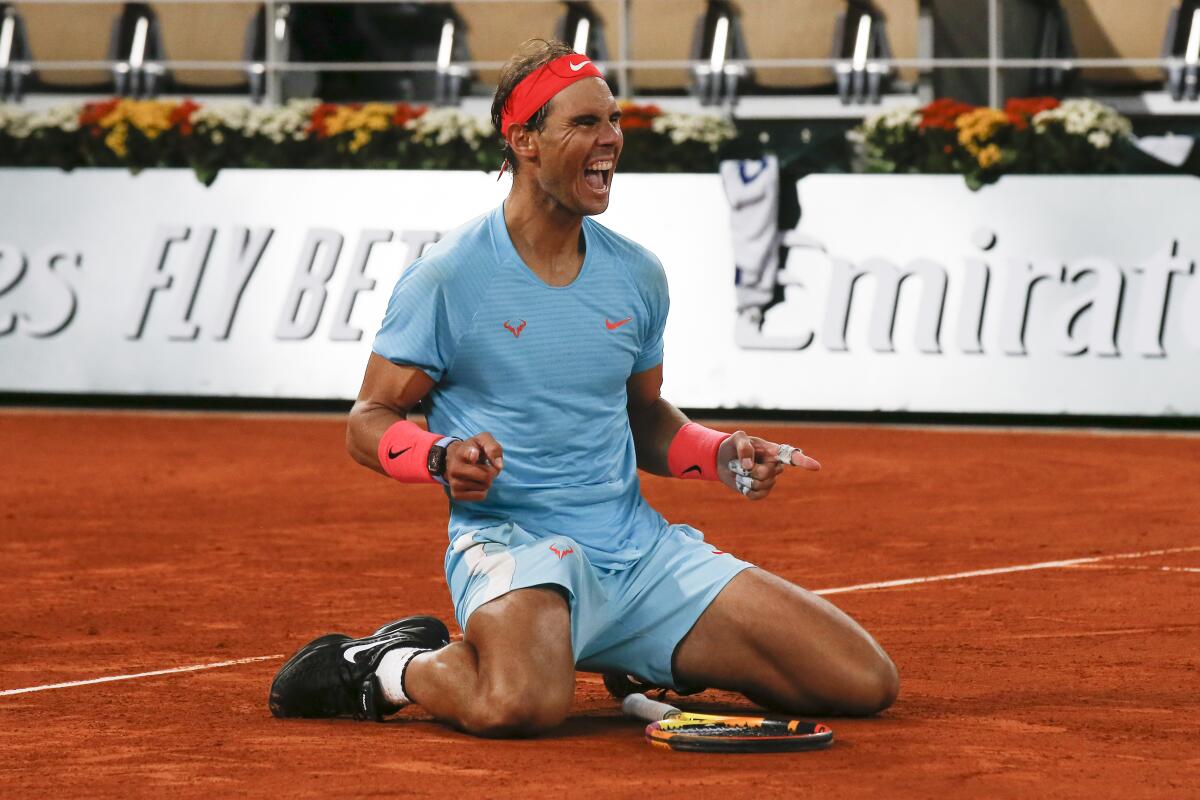
- Share via
PARIS — For years, Rafael Nadal pursued, and achieved, greatness at the French Open and other major tournaments. He never made a big deal out of his trophy total or the way he kept gaining on rival Roger Federer in the Grand Slam standings.
Now, thanks to a flawless performance against Novak Djokovic in the final at Roland Garros on Sunday, Nadal is finally there — tied with Federer at 20 major singles championships, more than any other man in tennis history.
Adding to his own French Open record trophy with No. 13 on its red clay, Nadal delivered a remarkably dominant 6-0, 6-2, 7-5 victory over the No. 1-ranked Djokovic.
“He keeps going. No holding him back, it seems like. It’s amazing. I mean, I admire all his achievements,” said Djokovic, who had won his last five Grand Slam finals. “There’s not much you can say. All the superlatives you can use, he deserves them.”
When Nadal ended it with an ace, he dropped to his knees, smiled widely and pumped his arms. It’s the fourth time he’s won his favorite tournament without ceding a set.
“The love story that I have with this city, and with this court, is unforgettable,” Nadal said.
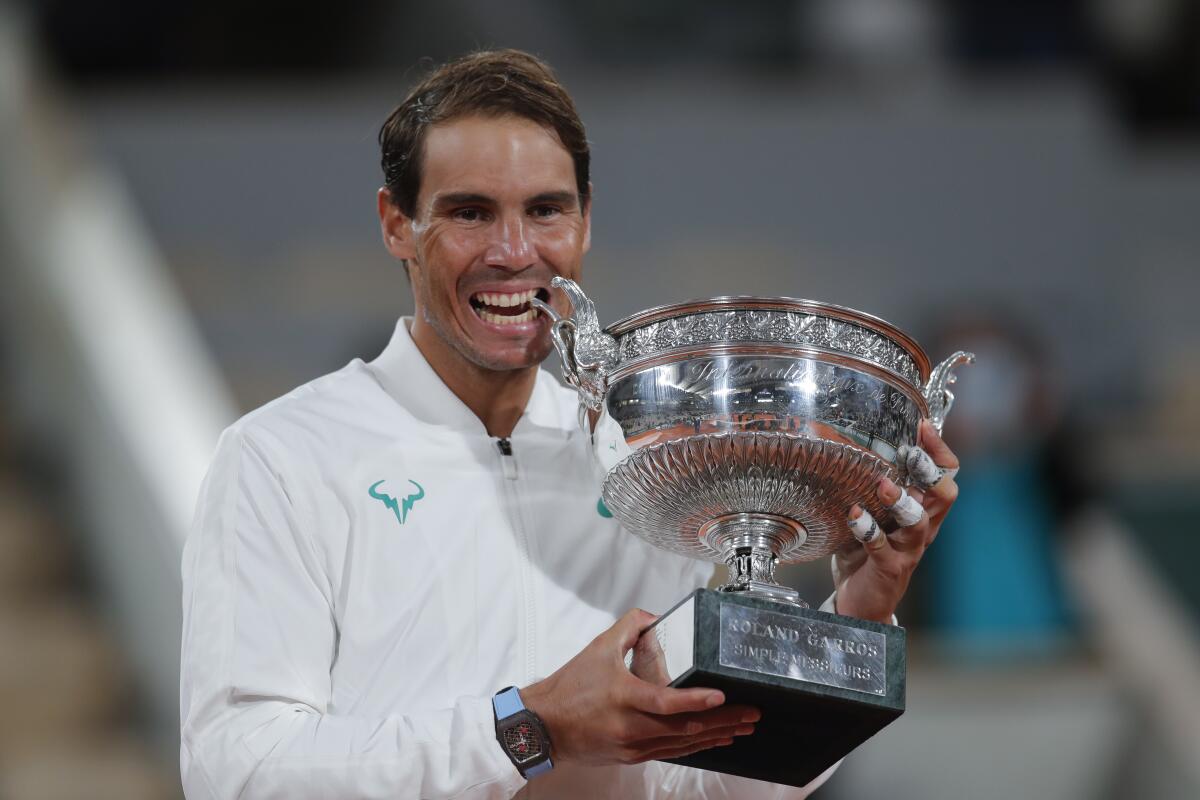
He deflected a question during the on-court, post-match interview about catching Federer, who is 39 and sat out the U.S. Open and French Open after having two operations on his right knee.
“[To] win here means everything to me, no? It’s not the moment, honestly [to] think today about the 20th,” Nadal said. “Roland Garros means everything to me. I spent, here, the most important moments — or most of the most important moments — in my tennis career, no doubt about that.”
About an hour after the match ended, Federer posted a congratulatory message on Instagram.
“I have always had the utmost respect for my friend Rafa as a person and as a champion. As my greatest rival over many years, I believe we have pushed each other to become better players,” Federer began, ending with: “I hope 20 is just another step on the continuing journey for both of us. Well done, Rafa. You deserve it.”
Nadal, No. 2 in the rankings, improved to 100-2 at the French Open, including a combined 26-0 in semifinals and finals, and picked up his fourth consecutive title in Paris. The 34-year-old left-hander from Spain previously put together streaks of four French Open championships from 2005-08, then five in a row from 2010-14, to go alongside his four trophies at the U.S. Open, two at Wimbledon and one at the Australian Open.
Nadal is now even with Federer for the first time since each man had zero Slams to his name in 2003. Federer’s first arrived at Wimbledon that year; Nadal, naturally, earned his first in France in 2005, by which point he trailed 4-0.
Djokovic’s loss left him at 17 majors; had he won, the trio’s standings would have read 20-19-18.
“It’s honestly a pleasure — in some ways, it’s a pleasure — sharing this great era of tennis together,” Nadal said. “On the other hand, [there] have been tough battles for a long time.“
This was the 56th installment of Nadal versus Djokovic, the most meetings between any pair of men in the professional era, and their ninth in a Grand Slam final, equaling Nadal versus Federer for the most.
Djokovic had won 14 of the last 18 matchups against Nadal, and led 29-26 overall, including a 6-3, 6-2, 6-3 win at the 2019 Australian Open final.
Nadal allowed Djokovic one fewer game this time.
“In Australia, he killed me. Today was for me,” Nadal said. “That’s part of the game.”
The key statistic Sunday: Nadal limited his unforced errors to 14 across 183 points, impressive against anyone, but especially someone the caliber of Djokovic, who accumulated 52.
“He did surprise me with the way he was playing, the quality of tennis he was producing, the level,” Djokovic said. “I mean, he’s phenomenal. He played a perfect match, especially in the first two sets.”
The first set was a 45-minute master class conducted by Nadal, who came out incredibly crisply and cleanly, steering his high-rpm forehands precisely where he wanted them and using his defense-to-offense abilities to slide and stretch and flick balls back with aggression.
Appearing resigned in the early going, Djokovic generally was less loud than he often is when he struggles, not yelling at himself or toward his entourage, and not showing anger in other ways — such as the post-point whack of a ball that hit a line judge at the U.S. Open last month, earning a disqualification, his only other loss in 39 matches this season.
Instead, Djokovic was left to puff his cheeks or roll his eyes, lower his head or slump his shoulders, exasperated with himself, perhaps, but also unable to figure out how to counter the relentless perfection on the other side of the net. After one exchange, he put up his palms, as if to ask, “What can I do here?”
It was only the fourth 6-0 set lost by Djokovic in 341 career Grand Slam matches — and two of the others came in 2005, the year he made his debut at the major tournaments.
As he sat in his sideline seat digesting that shutout of an opening set Sunday, four Djokovic supporters in blue jerseys and white baseball hats stood and sang in the stands, their chorus drowning out the light pitter-patter of drizzle hitting the retractable roof.
The much-anticipated matchup between these two titans of their sport was the first indoor French Open men’s final, contested under Court Philippe Chatrier’s new cover. The day began with a blue sky and sunshine, but dark clouds eventually gathered, and when rain came about a half-hour before the scheduled start, the arena was shut.
From its stand in the VIP section, the trophy, La Coupe des Mousquetaires, glistened under the electric lighting that did away with the sharp contrasts of light and shadow seen on the court under the autumnal afternoon sun.
This also was the first French Open contested with players walking on court wearing masks on account of the COVID-19 pandemic, the reason the 15-day event was shifted from May-June to September-October and crowds were limited to 1,000 per day. On Sunday, those lucky enough to attend mainly were concentrated in not-very-socially-distanced dense clumps in the first 20 or so rows; the roof helped amplify cheers and roars reverberating around the enclosed space.
Perhaps owing to the mostly lopsided nature of this final, though, they often were silent, so much so that the sound of Djokovic peeling the plastic cover off a new racket could be heard.
The postponement led to colder, wetter weather than usual, which affects the way the clay affects shots, making them bounce lower and slower. There was a school of thought that could hinder Nadal, as would this year’s change to a slightly heavier tennis ball.
So much for that.
What didn’t Nadal do well all tournament and on this historic day?
He dealt with Djokovic’s predilection for drop shots much better than previous foes of the 33-year-old Serb, using anticipation and speed to dim that strategy’s success.
“Didn’t work great today, let’s say,” Djokovic acknowledged.
Nadal took five of Djokovic’s first six service games and broke seven times in all.
Nadal faced only five break points himself, saving four.
More than two hours in, when Djokovic employed a backhand winner to get his initial break on his fifth opportunity, making it 3-all in the third set, he let out a couple of roars and waved his arms to ask for more noise from fans.
But it was too little, too late. Less than a half hour later, it was over.
“Rafa has proven everybody wrong,” Djokovic said. “That’s why he’s a great champion.”
More to Read
Go beyond the scoreboard
Get the latest on L.A.'s teams in the daily Sports Report newsletter.
You may occasionally receive promotional content from the Los Angeles Times.
